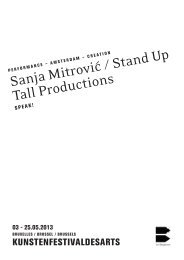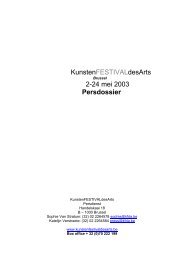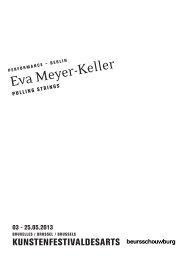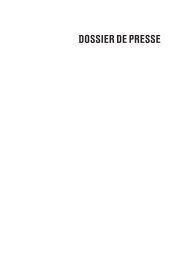Press File - Kunstenfestivaldesarts
Press File - Kunstenfestivaldesarts
Press File - Kunstenfestivaldesarts
Create successful ePaper yourself
Turn your PDF publications into a flip-book with our unique Google optimized e-Paper software.
Mysticism, life-art and another voice<br />
Endless Medication is a story about women in a patriarchal society, told and performed by two<br />
young women in tune with their madness, two actors seeking a language and a truth of their<br />
own.<br />
In this production Marijs Boulogne and Manah Depauw head off in search of their own voice: a<br />
different way of speaking, an angle of artistic effect that goes beyond the eternal debate<br />
between the ‘female genre’ and ‘femininity’. They craft an artistic form suited to allowing this<br />
suddenly emerging other voice to be heard. A female voice, frequently stifled, an excessive<br />
voice. It’s about re-enhancing the status of its specificity and past history. Its artistic echo<br />
perhaps? Completely breaking away from the dominant norms. A female art repudiating logic<br />
and all the dogma that is advocated on ’so-called’ reality. A voice developed from intellectual<br />
and intuitive research, evaluating what is “real and true” according to personal experience, a<br />
voice inspired by the chaotic perception of reality, by not knowing.<br />
For Endless Medication, Marijs and Manah have investigated other manifestations of these<br />
voices. They have looked into the mysticism and corporeal ecstasy of the Beguines of the<br />
Middle Ages and the contemporary practice of female ‘performance art’. Each in their own way,<br />
these two manifestations come from attempts to express the unspeakable, to explore and<br />
provoke it in order to place the body in an extreme physical situation. “Life-art” or ‘performance’<br />
tries to incorporate the unspeakable, chaos and reality in an ultimate confrontation between the<br />
idea and the body, non-movement.<br />
Medieval corporeal mysticism seeks to attain what is ultimately unspeakable – God as<br />
absolutely nothing – by self-denial through mortification and asceticism. Denial and mortification<br />
are based on a dynamic combining the fantasy of innocence with the temptation of supreme<br />
harmony. Accompanied by acts of penitence, it is staged in a fantastical way, undertaken to<br />
intercept emotions barely conscious of guilt, uneasiness and indecisiveness.<br />
The story of Endless Medication is inspired by the life of one of these great mystics, Saint Rosa<br />
of Lima (1586-1617). Plagued by a painful illness, this nun suddenly became lost in recurrent<br />
ecstatic visions. Impervious to the extreme pain, she lived as a penitent, praying and fasting in a<br />
cell in the middle of the family garden, continually insulted by all around her.<br />
With Saint Rosa in mind, Marijs and Manah began writing and improvising and the<br />
story of Rosa was born, first as a performance artist then as a fakir. Given a Belgian<br />
tinge, this story is stained by Catholicism, troubled by erotic infantile-abominable<br />
fantasies and perturbed by tunes from a melancholic accordion.<br />
Endless Medication<br />
With the atmosphere of a small old variety hall, Endless Medication tells the story of Rosa, a<br />
strange girl with a ‘fantasy of innocence’. No-one, not her mother or grandmother, has ever<br />
seen Rosa cry. From childhood Rosa develops strange occupations: she makes crowns of<br />
flowers in which she plaits a ribbon of iron with small nails that cut into her. Rosa wants to<br />
become a fakir. She picks horrible plastic flowers in cemeteries; at the supermarket she covers<br />
herself in washing powder then jumps in the canal; she knits insect blankets and tries to go to<br />
sleep under them.<br />
One day she receives a visit from God. He tells her she can come to heaven, but not before<br />
she’s given birth to the new messiah who is growing in her large intestine. As a child of God<br />
can’t be born in shit, she has to stop eating and can only breathe air using a machine specially<br />
sent to her by God.<br />
Every day Rosa inhales the air she’s allowed and to start with everything goes well. But hunger<br />
starts to gnaw away at her and she feels she will die if the new Jesus remains in her stomach.<br />
She begs God to help her, but he doesn’t hear her. Rosa decides to dislodge the child by giving<br />
birth prematurely. Of course things go wrong and Rosa has to call the doctor who tries to<br />
convince her that God doesn’t exist and that life is ugly. After visiting the doctor, God speaks to<br />
her again, annoyed because she has failed.<br />
26






